
The future of funerals
09 January 2024
Humans have been burying the deceased for thousands of years. But with British cemetery plots fast running out, are we ready to say goodbye to burials?
We surveyed 2,000 UK citizens (aged 16 and above) to get their verdict on the future of funerals. Do we have cultural and climate concerns about cremation? And will we embrace new technologies for when we depart?
You might also be interested in...
Here's what the public told us:
- Sheffield is the city where respondents were most likely (35%) to say that climate concerns will influence how they wish to be disposed of after death.
- Young people (aged 16-24) are more likely to choose a traditional burial (41% in total) than over 55s (18%).
- Nearly a quarter (24%) of 16–24-year-olds said that religion or culture will ‘strongly influence’ their own funeral arrangements, compared to just 12% of people aged over 55.
- A majority (54%) of people are open to futuristic methods of disposition such as water cremation, with just 37% ‘not open’.
- Cost is the main factor that influences people’s funeral arrangements, cited by 58% of respondents. Legal & General’s own research estimates that the average cost of a UK funeral in 2023 is £4,450.
Cremation versus burials: the state of the nation
For centuries, burials were the most common method of disposing a body in Britain, until cremations overtook burials for the first time in 1968. This trend accelerated during the COVID-19 pandemic when funerals were restricted; in fact, 2020 saw the highest number of cremations ever recorded in the UK, rising by more than 15% in just one year. By 2022, a record 79.83% of deceased people were cremated.
Generally, our survey echoes these statistics. Overall, almost half (48%) of respondents told us they’d prefer to be cremated, 26% said they’d rather be buried, while 19% had no strong opinion.
But when we explored the breakdown by age, a different picture emerged.
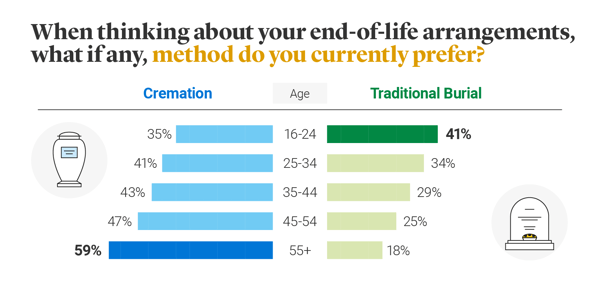
We found a striking generational divide in attitudes towards cremations and burials. Given that cremations have been the most popular disposition method for more than half a century, why are younger people bucking the trend when it comes to backing burials?
Climate concerns
At a time of growing environmental concerns, perhaps more people are aware that cremations generally produce significantly more carbon emissions than burials. Other concerns include the release of toxic gases from any implants that aren’t removed from the body, such as dental fillings or pacemakers.
Did our survey respondents share these environmental worries?
- 40% of people said they’re aware of the environmental impact of traditional funeral practices such as burial and cremation (44% said they were unaware, and 16% were not sure).
- However, among people aged 16-24 years-old, 51% said they were aware, while 36% said they were unaware, and 13% were not sure.
- While just 30% of people said that climate concerns would play a role in their choice of funeral disposition, this rose to 43% among 16–24-year-olds.
We decided to map which UK cities are the most climate conscious when it comes to funerals.
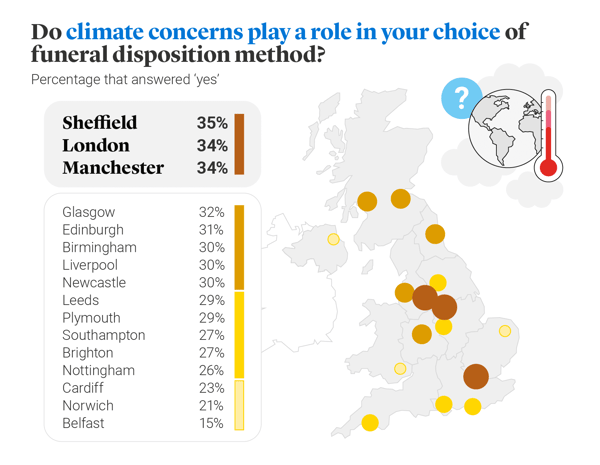
Changing cultural perspectives
While environmental views are one part of the story, our survey suggests that religious and cultural sensibilities may be reflected in Britain’s attitudes towards cremation and burial today.
Many religious faiths do not permit cremation, and instead choose to bury the deceased. In an increasingly diverse society of many faiths, are burials set to make a comeback?
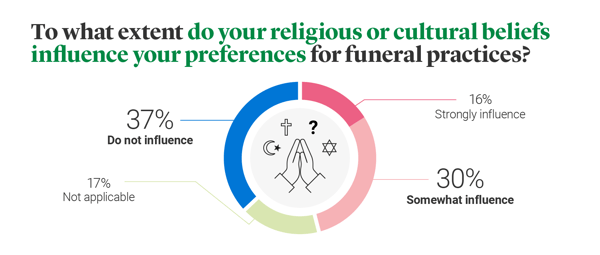
Notably, the younger the respondent, the more likely they were to say that religious or cultural beliefs ‘strongly influence’ their funeral preferences. Almost a quarter (24%) of 16–24-year-olds said that religion or culture is a strong influence, compared to just 12% of people aged over 55.
Additionally, 60% of 16–24-year-olds said that having a traditional funeral ceremony is important to them – the highest percentage of any age group – while just 43% of people aged over 55 said the same. And just 5% of 16–24-year-olds said they do not believe traditional funeral practices are still important – the lowest percentage of any age group.
But across Britain, opinions on this topic are broad ranging. For example, 40% of respondents from Belfast said that religious and cultural beliefs is the top influence on their funeral arrangements, compared to just 11% of people in Brighton.
Futuristic funerals
While our study suggests there is sizeable support for burial funerals among younger generations – whether on environmental or religious grounds – one challenge is that many local authorities in the UK are beginning to reach their capacity for burial plots. Could technological change and new methods of disposition transform the future of funerals?
Water cremations, sometimes known as aquamation or alkaline hydrolysis, are now available in the UK. This involves the body being placed in a chamber with potassium hydroxide so that it decomposes without producing harmful emissions.
Just 4% of our respondents selected aquamation as they preferred way to ‘bow out’. However, once awareness of the technology increases, will water cremation become widespread?
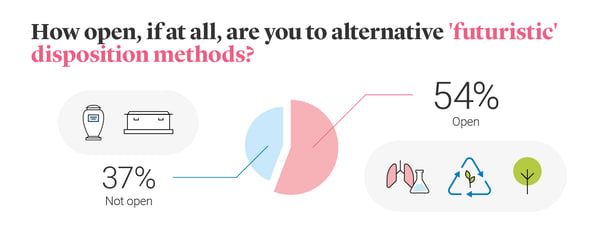
While younger people expressed the strongest preference for traditional funerals, they were also among the most enthusiastic for alternative disposition methods.
| Age | Open (net) |
| 16-24 | 56% |
| 25-34 | 62% |
| 35-44 | 58% |
| 45-54 | 54% |
| 55+ | 49% |
And beyond water cremation, people are ready to embrace wide range of modern ways to depart. Some of the open responses we received highlighted a preference fo human composting, green burials, donating organs to science, and funeral tree pods, where the body is placed into a pod made from natural materials, before a tree is planted on top as a memorial.
The 'cost of dying'
We've seen that climate considerations and cultural norms have shaped people's attitudes towards funerals. But when it comes to making the big decision, money often talks.
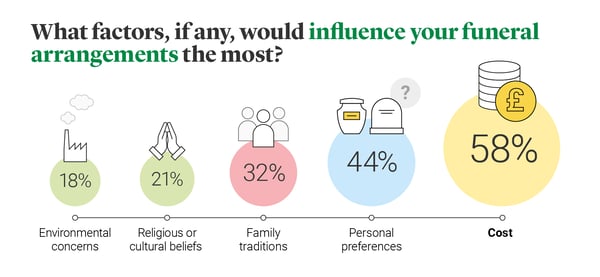
Legal & General research from 2023 estimated that the average cost of a UK funeral is £4,450. In fact, our study shows that the average cost of a cremation is £4,176, while for burials it's £5,493.
Planning for the future today
Our survey paints a fascinating picture of the future of funerals. Britons across the generations are both proud of their traditions and willing to embrace revolutionary new ways of saying goodbye.
Methodology
We surveyed 2,000 respondents (age 16 and over) in November 2023 to find out what the future of funerals looks like.